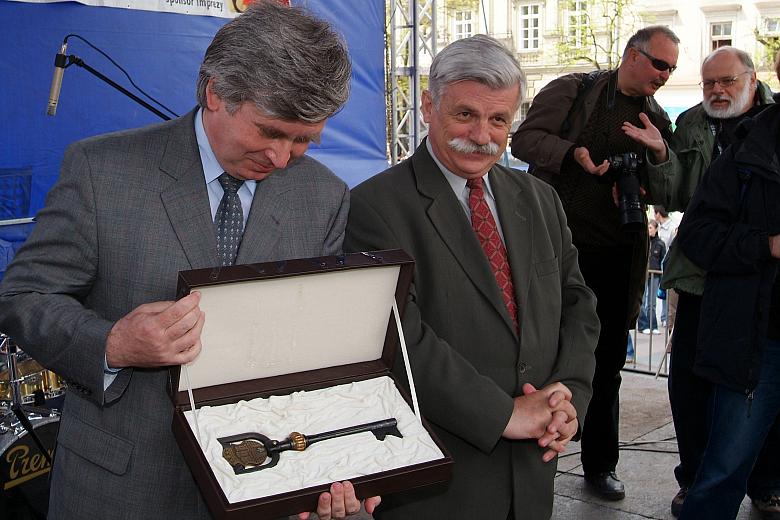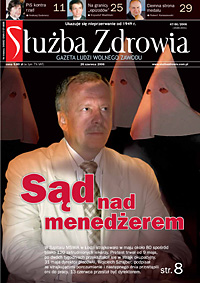|
|
Post by Bonobo on Mar 2, 2008 0:16:33 GMT 1
Every year in May uni students organize Juvenalia, the Students Festival. en.wikipedia.org/wiki/JuwenaliaJuwenalia (Polish, from Latin Iuvenalia - Juvenalia) is an annual students' holiday in Poland, usually celebrated for three days in late May, before the summer exams, sometimes also at the beginning of June. Juwenalia are celebrated in all colleges in Poland, with different names depending on a school or a city. At Medical Academies, they are called Medykalia, at Academies of Economy - Ekonomalia. At the University of Opole, they are called Piastonalia, at the Silesian University of Technology in Gliwice - Igry, at the Gdansk University - Neptunalia, at the University of Zielona Góra - Bachanalia. Juwenalia start with a triumphant parade of colorfully dressed students. The participants march from a college's campus to city's main square, where in a symbolic gesture, the mayor of a city hands keys to the city's gates to the students. The three days are free from lectures and filled with concerts, parties, sports events as well as beer drinking.
At a time of the assassination attempt on Pope John Paul II on May 13, 1981 it was decided to cease the celebrations that year. |
|
|
|
Post by Bonobo on May 15, 2008 19:06:55 GMT 1
Juvenalia is both a young and a dying tradition. It all started in 1954 from the Igrce ¯akowskie (students’ spectacles) organised in the Wolski Forest. The first students’ celebration drawing upon the tradition of Kraków May festivals was attended by the students of the Jagiellonian University.
A year later they were joined by the students of the Kraków University of Technology. The idea to organize students’ celebrations caught on admirably fast. In 1956 the event moved to the centre of Kraków and gained its new name of Juvenalia. The event is said to have been initiated by Hieronim Kubiak, then a sociology student and later a well-known party activity included in the so-called potentially reformable. The name Juvenalia was supposedly invented by the future journalist, Stefan Bratkowski.
People who remember these times wonder till the present day how it was possible that during the dark night of Stalinism these celebrations could emerge so spontaneously, joyously and just for fun. It was a fiesta among the cheerless and dull events organised always to the honour of something and obligatorily anyway. Fistly, it seems that the authorities understood the need to let go of some steam from heated student minds; secondly, the Polish October 1956 was coming; and thirdly, the model behaviour of students during the first editions convinced the local party leaders about the harmlessness of these joyous practices.
Soon the celebrations gained a kind of scenario, frequently treated quite freely. It always lasted three days. Starting on Friday, Kraków inhabitants could admire the colourful parades of students marching from the campus and dressed up in attires varying from their regular outfits, and then more and more fancifully. Less refined attires could also be found, but … well. One year the streets saw a student dressed in a transparent foil bag and nothing else. He was accompanied by an elegantly dressed friend informing passers-by that he was the stage agent of the first Polish naked ass. Funny? Maybe not, but these days students get away with quite a lot. Already in the late 1970s there was a freshman student in Kraków walking around dressed up as a rocket with the Persching sign. It was an allusion to the press and TV propaganda drive against American armaments.
An important element of the first day was the meeting with the mayor of the city who solemnly presented the keys to the city gates to young people, which symbolised the transfer of power over Kraków to the students’ fraternity.
Sunday was the most important day of celebration climaxed with a great open-air ball on the Kraków’s Main Market Square. During this ball Miss Juvenalia, later gracefully (and not imitatively) known as The Nicest Female Student in Kraków, was elected. The first winner of this competition was Alicja Bobrowska. Juvenalia worth remembering took place in 1964 when the Jagiellonian university celebrated 600th anniversary of its foundation. Since the then Rector was named Professor Kazimierz Lepszy (English translation: Casimir the Better), the students took part in celebrations under the motto of Od Kazimierza Wielkiego do Kazimierza Lepszego (From Casimir the Great to Casimir the Better) which, nobody knows why, irritated the comrades from the Voivodeship Committee of Polish United Workers’ Party (PZPR). In the 1970s the atmosphere of Juvenalia turned a bit sour. The events of 1970 and 1976 and the growing social tension, particularly in Kraków academic circles, were increasingly reflected in the more and more numerous disguises and behaviours of students that expressed their opposition towards authorities. Many people lost the will to have fun. But youth had its own rights and the celebrations continued to finally subside. On the 7th of May 1977, in the townhouse at 7 Szwedzka Street, the brutally slain body of Stanis³aw Pyjas was found. Pyjas was a student of Polish philology at the Jagiellonian University, and well-known for his opposition activities. Outraged academics called for a boycotting of Juvenalia. On Sunday, the 15th of May, the joyous celebrations in the Main Market Square were replaced in Kraków by a silent march of students dressed in black. Juvenalia did not take place that year, nor in 1979 or 1980. Modest celebrations were organised in the hopeful 1981. In the subsequent years of martial law and the so-called third stage of reform, nobody wanted to laugh. May in Kraków was an ordinary May. Despite the efforts of the authorities that organised various events and wanted to necessarily show that everything was going in the right direction, students stayed in their dormitories. Juvenalia came back only after 1989, though in a much more modest form. So will the old Juvenalia return? Doubtful. It emerged rapidly and Kraków’s youth treated it like a breath of fresh air for one kept in a stuffy room. The greatest strength of these celebrations was their spontaneity. Today though, students have many more opportunities to have fun.
More pics from The Students` Festival - Juvenalia. It has just finished. All cities with at least one university held theirs.
|
|
|
|
Post by Bonobo on May 15, 2008 19:30:10 GMT 1
Krakow`s mayor handed the symbolic city key toi students. This act means that students take total control for a few days.   |
|
|
|
Post by locopolaco on May 16, 2008 2:53:57 GMT 1
 what's up with the clansmen?  |
|
|
|
Post by Bonobo on Jun 7, 2008 21:21:18 GMT 1
what's up with the clansmen?  Do you mean Ku Klux Klan? |
|
|
|
Post by Bonobo on Jun 7, 2008 21:26:55 GMT 1
See how the students play with lights in their dormitory in Wrocław. Amusing and amazing. Dog Rex from a Polish cartoon A song Jozin z Bazin James Bond Chuck Norris Close Encounters of the Third Kind Alien 2 They use the lights to celebrate serious occasions too.  |
|
|
|
Post by locopolaco on Jun 7, 2008 21:58:00 GMT 1
what's up with the clansmen?  Do you mean Ku Klu Klan? yes |
|
|
|
Post by Bonobo on Jun 7, 2008 22:20:23 GMT 1
I am not sure. Nothing special, probably. Just a little provocation. looking at other photos, you can easily discern various historical costumes. For Poles KKK rates the same as Roman gladiators - I mean the attitude is rather neutral. However, it is also possible it wasn`t KKK at all. In Poland there is a legend of the so called hood court trials - sądy kapturowe. Those students look like hooded judges.  |
|
|
|
Post by valpomike on Jun 7, 2008 23:05:22 GMT 1
Most of you are to young to know of the KKK, but I do. They had a stronghold in my area. I remember cross burnings, and things like that.
As a youngster, I remember a sign, in a near by city, that said, black person, don't let the sun set on your back. And this meant if you work here, be out of town by dusk.
|
|
|
|
Post by Bonobo on Jun 7, 2008 23:10:08 GMT 1
Most of you are to young to know of the KKK, but I do. They had a stronghold in my area. I remember cross burnings, and things like that. As a youngster, I remember a sign, in a near by city, that said, black person, don't let the sun set on your back. And this meant if you work here, be out of town by dusk. KKK was a sinister organization. You used past tense in your post. Does it mean that KKK is a thing of the past in US? |
|
|
|
Post by valpomike on Jun 8, 2008 18:56:47 GMT 1
In most places, but still doing their work, in other places, like prison, and down south.
|
|
|
|
Post by Bonobo on Jun 8, 2008 21:21:45 GMT 1
In most places, but still doing their work, in other places, like prison, and down south. Prison in what sense? |
|
|
|
Post by valpomike on Jun 8, 2008 22:58:25 GMT 1
Behind bars, doing time, for you wrong doings. The big house, the can, and super jail.
|
|
|
|
Post by valpomike on Jun 8, 2008 23:04:24 GMT 1
your
|
|
|
|
Post by Bonobo on Jun 9, 2008 21:30:03 GMT 1
Behind bars, doing time, for you wrong doings. The big house, the can, and super jail. Oh, I see! ..and the slammer too. |
|
|
|
Post by Bonobo on Apr 29, 2017 23:50:52 GMT 1
|
|